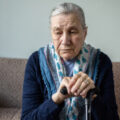
Care home providers face losing 40,000 staff from the government’s policy of requiring all their staff to be fully vaccinated, exacerbating job losses already suffered this year.
The figure is the Department of Health and Social Care’s (DHSC) best estimate of the impact of its policy of requiring all staff working in care homes to be fully vaccinated, which will come into force in November. It represents 7% of the 570,000 people employed in in CQC-registered homes.
The DHSC calculated each job loss would cost £2,500 to replace in backfill, recruitment, induction and training costs, leaving providers with an estimated one-off bill of £100m.
However, independent sector care homes have already been losing staff since April this year, according to provisional figures released by Skills for Care, which showed drops in job numbers of 0.8% in April, 0.7% in May by 1.6% in June. The The decline has been steeper for care homes for older people, nursing homes and among care worker roles .
In relation to care worker jobs across the residential sector, estimated losses were 1.9% in April, 1.6% in May and 3.4% in June. This is in contrast to the situation in domiciliary care – for which compulsory vaccination will not apply – which saw estimated job growth of 0.6% in April, 1.1% in May and 0.1% in June.
‘Potentially catastrophic’
The reasons for the drop in care home jobs specifically are unclear, though services have seen significant drops in occupancy as a result of the pandemic, potentially reducing the need for staff. Occupancy rates fell from 84% in March 2020 to 75% in May 2021, among homes without nursing, and 87% to 81% among nursing homes.
However, provider leaders pointed to factors to do with the supply of staff, with care workers exiting the sector due to stress and burnout.
A recent survey by third sector provider umbrella body the National Care Forum (NCF) found that about 60% of members had seen an increase in the rate of staff exit, with 40% of leaving staff departing for another sector.
NCF chief executive officer Vic Rayner warned that the government’s estimates of the impact of the vaccine policy recognised the “very significant and potentially catastrophic challenges for the delivery of care if the right level of guidance and support is not available”.
‘Stress and burnout’
Rayner added: “Early indications from members show that the trend for exiting social care is higher than normal, that some services have to close or be reorganised as a result of these shortages, and that we have a workforce that is stressed, burnt out and looking for the door.”
She also said that while many staff were leaving to join the health sector, others were going to join hospitality and retail, which also face a high vacancy rate. Per 100 jobs, there are about 4.5 vacant positions in accommodation and food service activities according to the Office for National Statistics figures released this month, compared with an average vacancy rate of 2.9% across all industries.
With turnover of 29.6% in residential homes and 36.8% in nursing homes in 2019-20, the government’s analysis suggested that some staff who leave as a result of the vaccination policy would have left for other reasons. The DHSC also said it expected councils to manage the risks to local services of the expected job losses, in line with their duties under the Care Act, for which they would receive support from the DHSC’s regional team.
‘Over-optimistic’
However, on Twitter, Simon Bottery, senior fellow for social care at the King’s Fund, said that these anticipated mitigations of the impact of job losses were “over-optimistic”.
He said that many of the of those who normally leave their jobs go elsewhere in the sector rather than leave residential care altogether, as would be required under the vaccination policy. While some may go into domiciliary care, where the policy doesn’t apply, it’s not clear how much traffic there is between the two sectors, he said.
In relation to councils having contingency plans in place, Bottery added: “I look forward to hearing from those councils who feel they can deal with the loss of between 3% and 12% of their care home workforce.”



 Bournemouth, Christchurch and Poole
Bournemouth, Christchurch and Poole  Hampshire County Council
Hampshire County Council  Lincolnshire County Council
Lincolnshire County Council  Norfolk County Council
Norfolk County Council  Northamptonshire Children’s Trust
Northamptonshire Children’s Trust  South Gloucestershire Council
South Gloucestershire Council  Wiltshire Council
Wiltshire Council  Wokingham Borough Council
Wokingham Borough Council  Children and young people with SEND are ‘valued and prioritised’ in Wiltshire, find inspectors
Children and young people with SEND are ‘valued and prioritised’ in Wiltshire, find inspectors  How specialist refugee teams benefit young people and social workers
How specialist refugee teams benefit young people and social workers  Podcast: returning to social work after becoming a first-time parent
Podcast: returning to social work after becoming a first-time parent  Podcast: would you work for an inadequate-rated service?
Podcast: would you work for an inadequate-rated service?  Family help: one local authority’s experience of the model
Family help: one local authority’s experience of the model  Workforce Insights – showcasing a selection of the sector’s top recruiters
Workforce Insights – showcasing a selection of the sector’s top recruiters 

 Facebook
Facebook X
X LinkedIn
LinkedIn Instagram
Instagram
It’s actually quite shocking that the sector has 40,000 staff happy to ignore medical evidence and put people they are supposedly caring for in harms way. If pay in hospitality is better than ADASS has wasted their energies advocating for extra money for the sector. Either way it’s our loved ones that suffer. Unionise the staff, hold their employers to account, don’t turn away from the exploitation of low pay and poor working environments. Time for care over profit long overdue.
My frail elderly father in law is in a care home where we have been informed seven staff have tested positive for Covid. How can we justify health and social care staff (of which I am one), potentially passing on a life threatening infection to the people they look after. Is it acceptable to refuse TB screening or hepatitis jabs? Of course staff in this sector should be properly remunerated and they’re not, but equally, they must accept public health requirements.
I don’t think being vaccinated will stop staff passing on COVID ? both vaccinated and unvaccinated people can spread it so it seems. Maybe care staff don’t want to risk any vaccine injury to themselves so are choosing to leave for other employment which won’t require this.
Vaccination should be compulsory for everyone – wherever they work. Likewise vaccination passports for all ages (except children) whether in employment or not. (The only exceptions should be on health grounds and should require a doctor’s certificate to say they are exempt).
If people choose to leave their jobs rather than have the vaccination, then they should be denied unemployment benefits. These selfish refusers do not have the right to put the population at risk.
People should not be forced in to having a medical intervention which is unlicensed and still in phase 3 of a trial until 2023. Some people are hesitant because of this and because there is no long term safety data.
Looking at data in the yellow card reporting scheme on the government website there seems to be a concerning number of adverse reactions and deaths being reported from these vaccines but this is not reported in the media! Why???
So back off from these care staff who have chosen not to have a experimental jab. No one seems to be highlighting the fact that some family members of care home residents may not of had the jab either and will be visiting there relatives so stop victimising carers!
The vaccine is licensed, and it’s passed all the requirements to be licensed and used. The yellow card reporting scheme doesn’t mean the adverse reaction was caused by the vaccine, but that it happened after the vaccine – they could be totally unrelated.
It’s not an experimental jab either.
Stop spreading misinformation.
I wonder how many of these folk are leaving care home work because of a reluctance to be vaccinated. It seems equally likely they are leaving because during the time of Covid they have faced huge danger and stress and many must be burned out. No pay rise at all for care staff, little acknowledgement of their dedication combined with job vacancies in hospitality and retail – can’t blame them for voting with their feet.
Vaccinations were given emergency approval across the world because of the pandemic. When people are dying in the hundreds of thousands that is absolutely the right thing to do and full licensing is in progress.
As for yellow card adverse reactions, I have seen many reported in the press but I would urge you to look at adverse reactions for aspirin, paracetamol and many common antibiotics. There are risks and benefits to all medications but when we know the levels of serious illness and deaths associated with Covid I cannot understand how we think it’s reasonable to allow health and care home staff to bring potentially life threatening infections to the people they look after.
Any visit to my father in law’s care home has to be preceded by a negative Covid test and I show proof of a double vaccination.
I am not advocating forced vaccination for everyone, but if you want to work in health and social care providing personal care, then that should be a condition of employment.